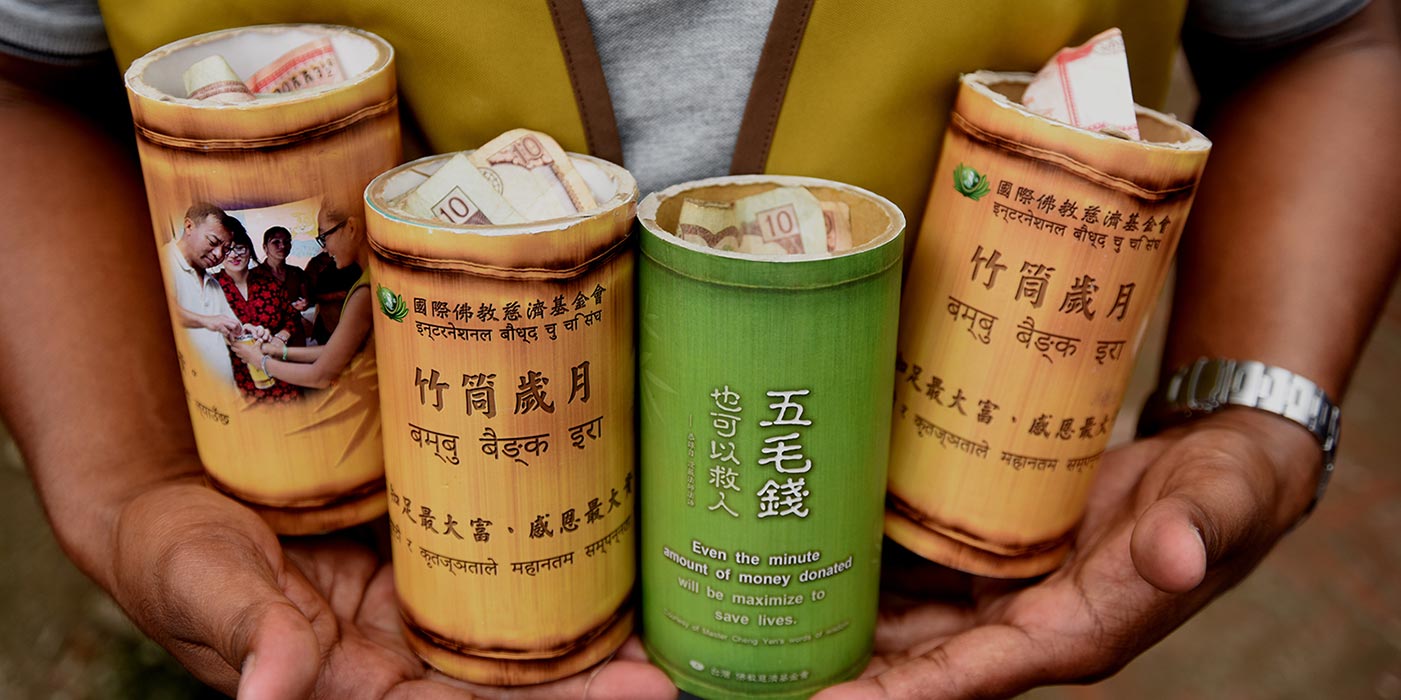SHARE

1966
The Spirit of the Bamboo Bank Era
August 19, 1984
Visit with Regular Donors from Kaohsiung
Everyone’s help is needed to spread the mission of Tzu Chi. Every day, the housewives set aside fifty cents of their grocery money before going to the market. As soon as they arrived at the market and saw someone they knew, they would tell them, “I save fifty cents of my grocery money every day.” Thus, the housewives began to spread the message of saving fifty cents every day whenever they went to the market, and the number of regular donors gradually increased.
It was the same with the relief work. As small amounts of money came together, we encountered people in need to give it to; it was as if we had the eyes of Guanyin Bodhisattva.
When we were first starting out, word began to spread from person to person. Upon learning of our intent, one of the regular donors who was saving fifty cents a day said, “Our next-door neighbor is an elderly woman from China. After Taiwan was liberated from Japan, she came here to look for her husband, but her husband had already passed away. She cannot return to China and has no children here. Now, she is ill and bedridden. Can you help her?” Thus, we had now found someone who was in need of our help. This woman in her eighties, Mrs. Lin-Ceng, was our very first care recipient, and she received our first month’s worth of donations.
December 24, 1988
Lecture to Taiwan Tzu Chi Volunteers
Tzu Chi was founded over twenty years ago by people who saved fifty cents a day to help the poor. Back then, the thirty donating members saved fifty cents a day from their grocery money, totaling NT$450 a month. In addition to that were the six practitioners who followed me in spiritual cultivation. They made one extra pair of baby shoes each day, which sold for NT$4 each, earning over NT$700 a month. In total, we raised over NT$1,000 in one month when we began our relief work.
April 13, 1996
Jing Si Lifestyle Camp for Entertainment Industry
Thirty years ago, during its earliest days, Tzu Chi was known as the Buddhist Difficulty-Overcoming Tzu Chi Merit Association. The word “difficulty” refers to the difficult lifestyle we had in the beginning. Back in those days, I wanted to help others, but truthfully, I didn’t even have the NT$1.50 for bus fare from the Abode to Hualien.
My own everyday life really was truly filled with great hardship. I often had to walk from the Abode to Hualien. In order to help others in such difficult times, I had to call upon people to contribute their strength in a way that did not disrupt their daily living. So, at that point, I took thirty bamboo stalks and cut them down into thirty bamboo banks, which I gave to the thirty housewives to put fifty cents into each day.
These housewives said to me, “Master, this is so strange. Why do you want us to save fifty cents a day? If I just give you NT$15 a month, isn’t that the same?” I said, “No, it is not. Then you are only emulating the compassion of Guanyin Bodhisattva once a month. My hope is for everyone to demonstrate Guanyin’s compassion and have thoughts of goodness every day. So, I hope is that on a daily basis, the moment everyone goes out the door to the market, they make sure to set aside fifty cents in their bank.”
May 11, 1997
Northern Region Leadership Meeting
We must be able to integrate the Buddha-Dharma into our handling of ordinary matters. We must put it into action, rather than speaking about it emptily or limiting ourselves to the words written in the sutras. Instead, we must go out among people and carry out the bodhisattvas’ mission of compassion to help the world. It was around this time when I encountered those three Catholic nuns who compared Buddhism to Catholicism; this had a very great impact on me. In truth, while the principles of Buddhism are comprehensive and subtle, Buddhists had not done much to actively help people in the world.
Yet, full of faith, I vowed to enable everyone to keep watch over sentient beings with the compassionate eyes of Guanyin Bodhisattva. I further vowed to help everyone reach out their hands like Guanyin Bodhisattva to help sentient beings. These are the principles that Tzu Chi was founded on. I started to call upon everyone, “Be someone who helps others in a way that does not disrupt your life.” I advised everyone that exercising frugality with their grocery money would not disrupt their lives at all, and that they would be doing good deeds at the same time. This is when the spirit of the bamboo banks was born.
April 12, 1998
Volunteer Morning Assembly
If it were not for those initial fifty cent donations, how would we ever have arrived at Tzu Chi’s Four Missions today? So, I constantly say, “Many grains of rice make a bushel; many drops make a river.” We must gather grains of sand to build a stupa. This is what we must do to create a pure world, an ideal world where we can live out the Buddha-Dharma and become Living Bodhisattvas.
November 2001 Tzu Chi Monthly, Issue No. 420
At the time, many of our regular donors were poor exchange students. In order to emulate the spirit of the bamboo bank era from our difficult early days, they cut a slit in the top of a peanut can and gave it to our donors, saying, “It is fine if you don’t have money; it’s the thought that counts. Just put your change in here, and you can do good deeds!” When Hualien Tzu Chi Hospital was being built, they used this method to raise funds for ten hospital beds.
December 31, 2005
Northern Region Commissioner and Faith Corps Certification and Year-End Blessing
Asking those housewives to save fifty cents a day of their grocery money did not greatly offset the amount of food they were able to put on their tables. So, I promoted a lifestyle where people could put forth some effort without disrupting their lives. Tzu Chi started with fifty cents. I gave everyone a bamboo bank and asked them to limit themselves to putting in just fifty cents right before their daily trip to the market.
Someone asked, “Master, do we have to do it this way? Why do I have to save fifty cents a day when I could just give NT$15 a month?” I told her, “I do not want your NT$15 a month; I want your fifty cents a day.” “Master, fifty cents a day for thirty days is NT$15.” I said, “I know, but the mindset behind it is different. If you donate NT$15 a month, you only demonstrate your compassion once a month. I want everyone to demonstrate compassion every day, so I want you to make this a daily practice before you leave to buy groceries.”
She asked, “Why do I have to do it before I go out to buy groceries?” I said, “You are donating 50 cents in order to help others. The memory of this will be fresh in your mind so that when you leave for the market, you will want to be frugal. Then, when you go to the market, you will save this fifty cents by being frugal with your grocery money.”
April 2006 Tzu Chi Monthly, Issue No. 473
In 1966, our first care recipient, Mrs. Lin-Ceng, needed NT$300 a month. By the second month, the number of care recipients who needed our help began to increase. We needed to bring together the strength of many people in order to raise the amount of money we needed to help others. So, we used the spirit of the bamboo bank era.
January 5, 2007
Changhua Year-End Blessing
When we put money in the bamboo banks, the amount we put in is not important. What is most important is that we give rise to good thoughts and create blessings for our families every day. When good thoughts come together, they form blessings, and these blessings will rise up. I want everyone to remember their aspiration to do good deeds and help others. As long as you seek to do good deeds every day and help others, you are a blessing unto yourself. Our small donations create blessings for others, while our good thoughts create blessings for us. So, I want everyone to aspire to help others every day.
January 30, 2007
Northern Region Commissioner and Faith Corps Year-End Blessing
Tzu Chi has been around for forty-one years now. When it comes to the yearly cycle of growth, each year has four seasons. Tzu Chi’s cycle of growth has given rise to four missions, having added one mission every ten years. Now, after forty-one years, we have four missions. Someone once asked me, “Master, what is your fifth mission for the next ten years?” I replied, “To return to Tzu Chi’s cycle of growth.” In the past, we sought to open the doors of charity to Taiwan, but now we seek to open them to the world.
In today’s world, there are many people who live on the brink of starvation. In a population of 6 billion, nearly 800 million people go hungry. Those who suffer from starvation and malnutrition number about 200 million. There are so many people who live in hardship. Now, we should return to our origins of forty years ago and ask people to help others in a way that does not disrupt their lives; it takes many drops of water to make a river and many grains of rice to make a bushel.
Now, Tzu Chi has gone international, and our volunteers go everywhere to conduct disaster relief. However, we must think about the possibility of liberating the world’s poor from their hardships. So, a new cycle of growth has begun for Tzu Chi, and we must spread our mission of charity work throughout the world.
March 9, 2013
Changyunjia Faith Corps Leadership Training
Context for the Teaching: Looking back on Tzu Chi’s distribution of rice seeds after Cyclone Nargis in Myanmar in 2008.
There were so many impoverished farmers there. Disaster relief work is only temporary, so to help people throughout their successive lifetimes, we must help them take the Dharma to heart. During each distribution, we would promote the “spirit of the bamboo banks” among the disaster survivors. Because Myanmar is a Buddhist country, we encouraged everyone to sow a seed of goodness, a good cause. By sowing a blessed cause, they would be able to reap blessed conditions.
At first, they would all say, “I don’t have any money.” But we replied, “That’s alright. Even ten cents or fifty cents is fine. That is the spirit of the bamboo bank era. When we add our drop of water to the ocean, it will never run dry.” Everyone took this to heart! However, some didn’t have even a single cent to give. They wanted to help out, but how? One family of four began to set aside a handful of rice before each meal and place it in a small bucket.
In this way, every several days, the small bucket would be full of rice, which they could use to help orphans, widows, and those families even poorer than their own. When I heard this news, I took it to heart, and so I keep talking about their “rice bank.”
